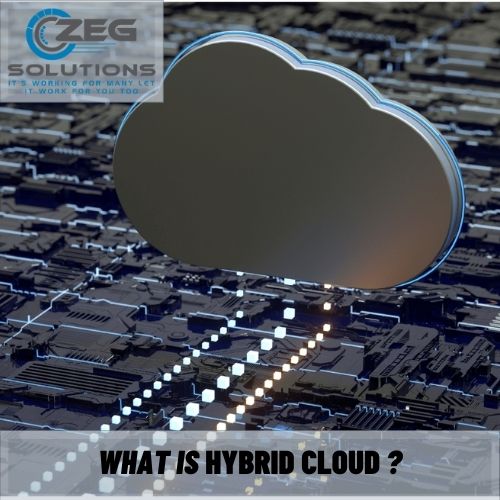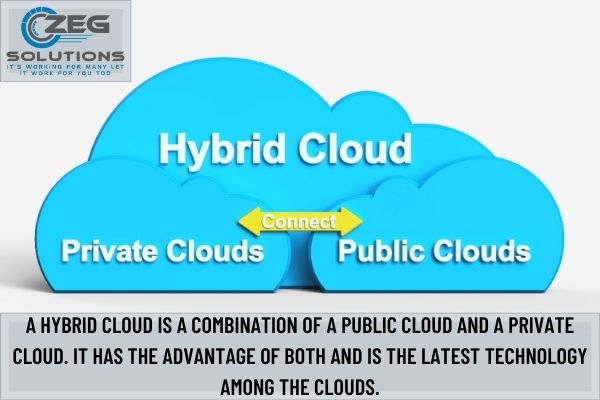One of the current trends in information technology is cloud computing. Cloud computing means storing data on a server – in a cloud. Public clouds and private clouds are different, and a hybrid cloud is an integration of both clouds. When organizations want all the computing services and the balance between them in place, the data transfer, and the time it takes to calculate that data, they need a logical middle ground; Hybrid!
For a time, cloud computing was limited to IT professionals and their class, and attention to security issues made it difficult to transfer data to cloud storage. With the new technology created in cloud services, organizations have shown more interest, and its latest model, the hybrid cloud, has found its place among various businesses.
Leading IT groups trust the cloud as a technological trend and compete for market share. The latest trick in the IT industry is the hybrid cloud. Many companies are still reluctant to use cloud services. Your security and reliability concerns are still grave. Stay tuned for more on hybrid hybrids, their advantages and disadvantages, and their applications.
What is a hybrid?
A hybrid is a combination of a public cloud (such as Amazon’s network services, Google cloud, or Giant Computer) and a private cloud platform designed specifically for the user company. Public cloud and private cloud establish encrypted communications independently of each other and transmit data and applications using technology.
The critical point in a hybrid cloud is that the private cloud and the public cloud are two separate and independent parts. In this way, organizations can store their confidential information in personal cloud storage. Still, they also can retrieve their data from the primary computing resources available in the public cloud. However, this feature exists only for a short time; Because they do not store information in the public cloud for a long time.
We need to know that we cannot build a hybrid system by connecting each separate server to the public cloud. The private sector structure must be able to run cloud services.
Data is stored centrally and efficiently within the network. The company has complete control over its preservation or removal. Also, data synchronization over the internal network is significantly faster than the Internet.

• Advantages of using a hybrid cloud
Available:
One of the essential advantages of a hybrid cloud is that the private cloud infrastructure is fully accessible and can be used on-site; In other words, there is no need for the public Internet. These features make it possible for the private cloud to reach users without delay and less time than public services.
Manage an average workload
Another advantage of a hybrid cloud is that its computing infrastructure can manage your average workload. In contrast, the probability of error when using the public cloud for the same amount of work is higher than the private cloud.
In general, the hybrid gives users more control over both the private and public sectors than pre-prepared public cloud platforms.
More economical
You can make more profit by using public cloud resources along with a faster calculation. For long-term jobs, such as requiring computational operations over one year, using a public cloud is more cost-effective than a private cloud.
Creating a private sector in the hybrid cloud also provides more flexibility in server design. This feature gives companies more speed and space to store them at a lower cost.
In what cases is a hybrid cloud not used?
Although a hybrid has many advantages over a public cloud, it still suffers from a negative public perception of public cloud security issues. Data transmission over the network may interfere with or interfere with other data, so organizations see the use of these services as a risk that does not need to be done.
The hybrid, like the public cloud, performs a time-dependent operation at the end of the data transfer. This operation is a data separation process in which ping time delay is observed. For example, Tatsuya Kimura, head of the International Meteorological Organization (JMA), has shown interest in learning about transferring weather forecast data to a hybrid.
At present, the supercomputer used in this organization is an 847 teraflop system made by Hitachi. The supercomputer helps meteorologists analyze post-earthquake signals, which are a tsunami alert. The supercomputer also helps predict earthquakes in Tokai in Japan with tectonic movements or earthquake-related structures.
But there is the issue of cost. Organizations with limited IT funding may not be able to create a platform for a hybrid cloud. It is the cost to build different hardware components in a specific space. Companies with lower budgets can use the services provided by the public cloud on site.
Who are the hybrid users?
The hybrid cloud is widely used in the financial field because it takes up little physical space and is located near the business location. Placing data and related processing and calculations in the public cloud space reduces the physical space used, and as a result, the work time is reduced. On the other hand, this feature can compromise data security. Cross-border trade algorithm is a job independent of other economic platforms, which for most of these enterprises is cloud services, a risk that is not necessary and may remove the internal issues of their work from confidentiality.
Using a private cloud to perform a typical workload and calculate and transfer it evenly to a public cloud is a more efficient and cost-effective organization.
Hybrid cloud technology is widely used in healthcare. This system transmits various patient information between healthcare institutions and insurance companies. Compliance with HIPAA (Health Insurance and Health Regulations) is a legal barrier to using a hybrid cloud in this area because this confidential medical information is categorized initially and regulated by HIPAA.
Other organizations are refusing to use the hybrid cloud for the same reasons. They usually keep their data encrypted to protect themselves from events such as hardware failures, natural disasters such as workplace storms or theft, and the like.
Small businesses are another industry that can use hybrid services. Transmitting and analyzing sales information is a complicated task. According to Brian Cantrell, Joyent’s chief technology officer, many corporations avoid Google and Amazon’s offer to use the cloud.
Amazon does not seem to be trusted because it is the biggest competitor to small businesses. On the other hand, these companies do not want to make their data analysis available to Google, the world’s largest search engine.
Why is a hybrid cloud a good option?
The hybrid cloud makes it very easy to communicate in the workplace. Tasks such as file management, internal messaging system, scheduling, data analysis, information related to various activities in the workplace, and other issues related to customer relationship management (CRM) are some of the actions that take place in the workplace. The use of public cloud is not recommended with printers, scanners, fax machines, security hardware such as CCTV cameras, fire-sensitive devices, and COs. Because these devices can interfere with public cloud compatibility. To use cloud services, you need crisis detection devices such as fire detectors and. Separated from the leading network of the organization.
In the hybrid model, users have more control over private and public components than pre-prepared public cloud platforms. Especially if business management is to be considered, this pre-built suite of server software (SaaS) is always subject to sequential redesigns and revisions that, if not done correctly, may destroy the original compatibility.
Hybrid Cloud Features
If we accept that the Hybrid Cloud inherits public and private clouds’ benefits, we can deduce the following results.
High flexibility and scalability:
Organizations can use Hybrid Cloud to prepare their organization’s network structure for current and future conditions.
If an organization has data that can not use personal servers due to insufficient processing power, it can use Public Clouds instead. Without having to generalize the network infrastructure and server of your organization completely.
Security:
Hybrid Cloud assures organizations that their data is secure.
Using the Hybrid architecture, you can store critical data or applications on a personal server and, if necessary, send only data to the cloud server that is of low-security importance.
Low cost:
In the Hybrid Cloud, if you need more processing or storage space, go to Public Cloud. So you pay for it when you need to upgrade.
Also, there is no need to maintain cloud servers and operating costs on these servers.
Error tolerance:
In organizations where permanent and uninterrupted access to data is critical, you can reduce the risk of not accessing data by storing copies of data in Public Cloud and Private Cloud.

Hybrid cloud Challenges
Although Hybrid Clouds have many practical benefits, there are also challenges to this architecture that we need to address for you.
If an external service provider manages the cloud server, the company incurs additional costs. At the same time, it raises the question of data security. Therefore, companies must be careful when choosing such service providers.
Security Complications:
Although cloud service providers do a lot to secure their servers, you still have some of Hybrid Clouds’ security with you.
The nature of the Hybrid Cloud model introduces several security complexities.
One of the most important of these is the hidden vulnerabilities that exist between the two cloud spaces.
Possible bottlenecks:
The most critical blockage in this architecture is sending data between Public Cloud and Private Cloud.
Sending information to the Public Cloud is via the Internet, but maybe slow due to the Internet’s slow speed. At the same time, the information in the private cloud is done at high speed.
This bottleneck can cause problems for applications that need to receive information instantly.
The significant aspect is the cost increase. Due to the division into public cloud and private cloud, dedicated and external servers are usually used. This makes the hybrid cloud model the most cost-effective of all three cloud computing models.
How to Tackle Hybrid Cloud Challenges:
- Data encryption in the private cloud
- Consider policies on some data, applications, and…
- Hiring a person who is a cloud specialist and knows security well.
- Use the services of providers that provide a direct connection to the structure of their Public Cloud space.
applications:
The most important uses of Hybrid Clouds are:
Sensitive organizations:
Some organizations, because they have sensitive information, can not use only solutions based on Public Clouds. Instead, they have to put this information on their servers. The Hybrid Cloud can be the best choice for these organizations, as it can specify what kind of data to transfer to the public cloud for processing and storage and what data to store on private servers.
Big Data Processing:
You can process big data in Public Clouds. You can also use Private Cloud and process sensitive data on your servers.
Old systems:
In an organization, there may be data in old structures that are still used. Public Clouds may not be the best option for these systems. In such scenarios, it is impossible to transfer all data and applications to the cloud because they may interact with several other methods. Moving all of this data can be costly. But with Hybrid Cloud, some of this data can be transferred to the cloud, and the rest can be left on the same systems.
Peak traffic:
You may have a store during a fantastic sale or any other event that could lead to remarkably high traffic to the server. In old solutions, you had to buy additional resources in such a situation. This could cost you dearly. If you use Hybrid Cloud, you can easily add a web server if needed and control this traffic at the lowest cost. This feature is also called Cloud Bursting.
Application development:
Another area where organizations have had great success with Hybrid Clouds is application development. Because organizations are using Agile and DevOps techniques, they are looking to increase speed. DevOps teams use public cloud space, and their rate is much faster. But when the application is ready, it is transferred to a personal data center. This saves them money. So Hybrid Clouds are good choices for companies.
result
There are three different concepts of cloud computing: public cloud, private cloud, and hybrid cloud. Other models offer their advantages and disadvantages. The hybrid cloud is a combination of public cloud and private cloud – a compromise between the two models. The goal is to combine these two types and ensure the highest possible level of security. This allows for flexible access to data. There are many benefits of public cloud and private cloud in the hybrid cloud. Like the public cloud, the customer can access data openly. An example is the use of free e-mail services. Those who use it do so through the public cloud. According to this model, companies’ computing capacity and storage space such as Office are provided to companies.
The advantage is that company employees can access data anywhere. Companies save most of their hardware and software and make less effort in managing IT. It is also guaranteed that the latest software versions are available to employees. This system has other advantages and disadvantages mentioned above.



